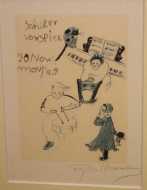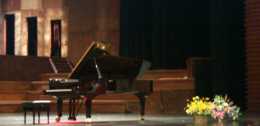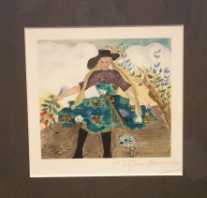 wn."
wn."
It was a triumphant climax to a show-business comeback story that sounds like the script of an implausible film. After living for years in obscurity as a music teacher in Germany, Fujiko Hemming suddenly emerged into the limelight in 1999, recording an album - La Campanella - of pieces by Liszt and Chopin that became the year's top selling classical album in Japan. Hemming is now in demand on the concert circuit, and she has become used to having reporters and TV crews descend on her delightfully bohemian home in Tokyo's funky Shimokitazawa neighborhood.
Hemming takes her belated rise to fame all in her stride.
After all, she has been there before. Born to a Japanese mother and a Swedish father in prewar Berlin, Hemming survived the trauma of the war and her parents' separation and embarked on a career as a concert pianist after graduating from the Tokyo University of Fine Arts and Music and the Berlin College of Music. But a fever contracted during a 1971 recital series caused Hemming to lose her sense of hearing just as she was poised to enter the first rank of concert pianists.
In 1995, she returned to Japan to live in the studio/residence left to her by her mother. A grand piano dominates the third floor's single room, in which Hemming holds court like the grande dame of an old-fashioned salon.
A question about a pencil drawing of a man with an umbrella, one of many pictures hanging on the wall, triggers a flood of memories. "That's a cartoon my father drew for the Asahi newspaper," Hemming says, explaining that her father was a painter and designer who at one time worked for German film studio UFA. His credits included doing the design work for the Marlene Dietrich classic of the thirties, Shanghai Express. "My father was like Pinkerton, in Madama Butterfly - he wanted to try Japan," Hemming comments. "And my mother was the daughter of a rich man, so he enjoyed himself for three or four years, and after that, it was good-bye."
That was in 1940, when non-Japanese -- even those from neutral countries like Sweden -- were decidedly less popular in Japan than they are now. Amid the turmoil of the war, Hemming's father was eventually deported.
Although Hemming is not clear on the details, it was about
this time that her mother learned that the man to whom she was
married had taken another wife in Sweden. "My mother didn't
want to have anything to do with him," Hemming recalls. "My
father was a Don Juan -- unfaithful, you see, never settling do wn."
wn."
Against this unstable domestic background, Hemming began studying the piano at her mother's behest. "My mother was scary and yelled at me to practice playing the whole day, so I didn't even want to look at the piano for a long time," Hemming comments. But her destiny was inextricably linked to that instrument. At 17, Hemming made her concert debut before going on to study piano at the Tokyo University of Fine Arts and Music under Leonard Kreutzer.
A part-time job playing piano at a Chinese restaurant in Tokyo's Harajuku district was the final push she needed in deciding once and for all to make music her career. "It was a great sensation," she says. "There were a lot of American officers and their families who came to hear me play. If I'd gone to America then, it might have been better."
Instead of America, Europe was where Hemming chose to live, studying in Berlin and Vienna. In the meantime, Hemming had become a stateless person. She lost her Swedish nationality at age 18 because she had never lived in that country, and under Japanese citizenship. But with the help of the German Embassy in Tokyo and the Japanese Red Cross, she was granted refugee status.
One is tempted to think that Hemming's rather tempestuous life story explains her preference for the lush, romantic music of composers such as Chopin and Liszt. But her explanation is more prosaic: "Their music is easy to understand. And I also thought it would be received well. When you give a concert, if you play Chopin and Liszt, you're sure to reach the audience. So I thought it would be the same with CDs. Even people who don't know anything about classical music buy La Campanella. As for other composers, well, I like Bach. I enjoy playing Bach for myself, but when it comes to playing in front of other people, Glenn Gould is so much better. I don't want to copy him."
While she was living in Europe, Hemming's playing came to the attention of such notables as Herbert von Karajan, legendary maestro of the Berlin Philharmonic. "Karajan had the image of being affected, like Frank Sinatra." Hemming explains. "But he wasn't really like that: he was aristocratic. Karajan was nasty; he would say things like, Go home if you can't play that note. He was that cruel. Aud cold. But that also meant the quality of his work was high."
In contrast to the rather forbidding Karajan, Hemming describes Leonard Bernstein -- with whom she also worked -- as "wonderful" and not a snob. "These days, Karajan is praised more than Bernstein. Bernstein was probably too good natured. With Bernstein, if you couldn't play something, he took pity on you and would say, You can go home now; we'll try again tomorrow. That was all. And so, of course, the quality falls."
It was Bernstein who recommended Hemming for a series of recitals in Vienna that were to have been her big break. But during the series, she contracted a high fever that left her totally deaf -- a crushing blow. "I should have stayed in Berlin or Vienna, but my hearing became bad. I moved to Heidelberg and taught at the music school there for 15 years. I kept dogs and cats, and that was it. I didn't want to read magazines or newspapers."
Hemming gradually regained some of her hearing, but remained
in self-imposed isolation in the university town. Even though
she had no Japanese friends there, Hemming did not forget her
Japanese. "People often find it surprising that I didn't
forget Japanese. But you don't forget. And I read a lot of books
too, especially Akutagawa."
Teaching children convinced Hemming that to learn music well, you have to like it. "I taught a lot of children, but their parents said they'd disliked piano lessons because their teachers were always forcing them to do finger exercises. I hated it myself when my mother told me what to practice. So I would play different pieces for my students and ask them which they enjoyed the most and we'd practice that one. I never imposed on them and never made them do fingering exercises. Gradually, that way you get to like music better."
Hemming's hearing is still a problem, which makes her reemergence as a concert pianist all the more remarkable. "I performed a nocturne of Chopin's in Nagano earlier this year. But at first I couldn't hear the bass notes at all. It's a slow piece, and I found I was playing the wrong notes. But then I went back to my dressing room in the interval, had a sip of tea and my hearing came back again, suddenly. When I got back and played, I could hear everything again."
Fate intervened in Hemming's life once again when her mother died in 1995, bequeathing to her daughter the family home in Shimokitazawa. Having nothing to tie her down in Germany, Hemming decided to decamp for her maternal homeland. She started giving recitals and gradually news about this lost treasure of classical music spread by word of mouth. TV documentary writer Keiko Toyota was one of those who heard about Hemming's poignant story. Toyota pitched the idea to the semi-public Japan Broadcasting Corp.(NHK), and the resulting documentary, aired in early 1999, led to tremendous public interest in the pianist.
Quick to capitalize on this was Japanese record label Victor Entertainment. Besides being impressed by the fact that Victor was the first record label to approach her, animal-lover Hemming also rated Victor highly because of its corporate emblem -- the familiar His Master's Voice picture of a dog listening to a gramophone. The album Hemming recorded for Victor, La Campanella, proved more popular than anyone had imagined. So far, it has sold some 360,000 copies, a phenomenal feat considering that Japanese record labels reckon they have a hit if a classical album sells just 10,000 copies.
Hemming's playing may not be to everyone's taste. Passion, not precision, is her byword, in contrast to the tendency among many classical musicians to play by the book, with little regard for the emotions behind the musical score. To her, the most important aspect of playing the piano is "the timbre of the notes, the color. For example, I read often that nobody has been able to get Karajan's sound, his color, out of an orchestra, and I'd like to be thought of in the same way." It thus comes as no surprise that Hemming is now planning to record various piano works of Debussy, that most impressionistic of composers.
Hemming is in constant demand on the classical concert circuit in Japan, and now her fame is beginning to spread internationally, thanks to write-ups in publications such as International Piano Quarterly. There is talk of Hemming doing a series of concerts in Germany, and Victor is negotiating with various overseas record labels to release Hemming's material. For Fujiko Hemming, it has been quite a comeback -- one that shows that sometimes in life there is a second act.